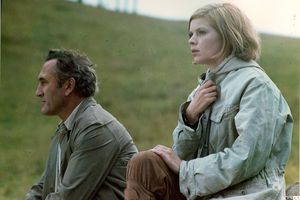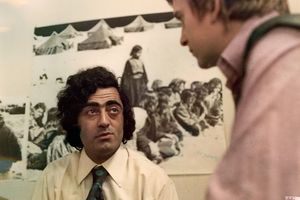Die Taube auf dem Dach
Director: Iris Gusner, 82 Min., Black-White, Feature Film
Deutsche Demokratische Republik (DDR)
DEFA-Studio für Spielfilme, 1973 - 2010
- Film/Video Format
- 35 mm
- Length in m
- 2269
- Other Title
- Daniel
- English Title
- The dove on the roof
- Premiere Date

(Dir.: Iris Gusner, 1973/2010) Graphic Design: David Knight
Short Summary (English)
DIE TAUBE AUF DEM DACH tells the tale of three wildly different people who are united by their search for their place in society and its ideals.
At a construction site for modern concrete flat blocks in the south of the GDR, Linda, the young and self confident site manager, meets two men. The first, Daniel (Andreas Gripp), is a student temping at the site during his holidays, whose idealism and spontaneity fascinate Linda. The second, Hans Böwe (Günther Naumann), has travelled through the GDR building houses wherever the contracts have taken him, but as a result has lost his own sense of home. Linda loses herself in her work and finds her independence important, though she’s on the brink of losing sight of her own happiness due to time pressure.

(Dir.: Iris Gusner, 1973/2010) Photography: Klaus Goldmann

(Dir.: Iris Gusner, 1973/2010) Photography: Klaus Goldmann
Film Crew
- Director
-
- Iris Gusner
- Script
-
- Iris Gusner
- Scenario
-
- Iris Gusner
- Camera
-
- Roland Gräf
- Film Editing
-
- Helga Krause
- Cast
-
- Heidemarie Wenzel (Linda Hinrichs)
- Günter Naumann (Hans Böwe)
- Andreas Gripp (Daniel)
- Annelene Hischer (Frau in der Bar)
- Erika Köllinger (Erika, Kranführerin)
- Monika Lennartz (Schallplattenverkäuferin)
- Lotte Loebinger (Lindas Mutter)
- Christa Löser (Sekretärin von Linda)
- Katrin Martin (Steffi, Böwes Tochter)
- Margarete Taudte (Daniels Mutter)
- Hilmar Baumann (Absatzleiter im Plattenwerk)
- Wolfgang Greese (Richter, Forstwirtschaftsleiter)
- Simon Harik (Kerim)
- Werner Heitel (Bernd)
- Herbert Köfer (Sturm, Glaskugelfabrikant und Vater Daniels)
- Willi Neuenhahn (Arthur, Böwes großer Kollege)
- Heinz Scholz (Lindas Vater)
- Christian Steyer (Lene, Trompeter)
- Günter Rüger (Günter, Böwes schmaler Kollege)
- Eva-Maria John (Frau Kramer)
- Karin John (Freundin von Bernd)
- Iren Sütö (Frau Dr. Sommer)
- Helmut Gauß (Herr Kramer)
- Jürgen Klauß (Fernando)
- Inken Gusner (Elke, Kind)
- Amina Gusner (Sabine, Kind)
- Assistant Director
-
- Ilse Goydke
- Assistant Camera
-
- Norbert Kuhröber
- Production Design
-
- Marlene Willmann
- Script Editing
-
- Dieter Wolf
- Music
-
- Gerhard Rosenfeld
- Sound
-
- Werner Schulze
- Klaus Wolter
- Helga Kadenbach (Tonmischung)
- Costume Design
-
- Günther Pohl
- Make-Up
-
- Gerhard Petri
- Franziska Zorn
- Production Management
-
- Fritz Brix
- Unit Production Management
-
- Lutz Wittcke
- DEFA Photography
-
- Klaus Goldmann
- Dubbing (Dubbing Actor)
-
- Ute Boeden (Erika)
- Marga Heiden (Lindas Mutter)
- Peter Reder (Lindas Vater)
- Helga Sasse (Frau Kramer)
- Inge Keller (Frau Dr. Sommer)
- Willi Schrade (Bauarbeiter)
- Ernst Steiner (Bauarbeiter)
- Hannelore (auch: Hanna, Hanne) Freudenberger (Frau)
Short Summary (German)
Auf einer Baustelle im Süden der DDR, wo Tausende von Wohnungen in moderner Plattenbauweise entstehen, lernt die aus Mecklenburg stammende junge und unverheiratete Bauleiterin Linda Hinrichs zwei Männer näher kennen: zum einen den Studenten Daniel, dessen Spontanität ihr gefällt; während eines Tanzabends bittet er zum Beispiel um Spenden für Vietnam und schlägt auch schon mal zu, wenn ihm unterstellt wird, er stecke sich das Geld in die eigene Tasche. Zum anderen trifft Linda auf den Baubrigadier Hans Böwe, einen Zugvogel, der schon an vielen Stellen der DDR Neues mit aus dem Boden gestampft, aber nie ein richtiges Zuhause gefunden hat. Böwe macht ihr einen Heiratsantrag - und betrinkt sich, als Linda ihm nicht sofort zustimmt. Wird sie selbst einmal so wenig sesshaft werden wie er? Und was bedeuten eigentlich so große Worte wie Glück und Geborgenheit in einer durchaus nicht romantischen Realität?
(Quelle: Das zweite Leben der Filmstadt Babelsberg. DEFA-Spielfilme 1946-1992)
Context (German)
Informationen zur Digitalisierung/Rekonstruktion des Films:
Der DEFA-Farbfilm "Die Taube auf dem Dach" entstand im Herbst und Winter 1972. Nach der Abnahme im DEFA-Studio für Spielfilme wurde er aus politischen Gründen nicht zum Kinoeinsatz freigegeben. Anders als bei anderen Verbotsfilmen wurde das Material nicht an das Staatliche Filmarchiv der DDR übergeben. Stattdessen wurde es im Studio vernichtet – mit Ausnahme der farbigen Arbeitskopie.
Im Zuge der Bearbeitung vieler Verbotsfilme 1989/90 fand der Regisseur Roland Gräf diese Arbeitskopie in der Ecke eines nicht klimatisierten Vorführraums. Weil diese Kopie erhebliche Schichtablösungen aufwies, veranlasste Roland Gräf die Herstellung eines schwarzweißen Dup-Negativs sowie einer Kinokopie. Die Ziehung eines farbigen Materials war aus technischen Gründen unmöglich.
Am 7. Oktober 1990 wurde "Die Taube auf dem Dach" im Berliner Kino "Babylon" uraufgeführt. Danach verloren sich erneut alle Spuren des gesamten Materials. Nach umfangreicher Suche gelang es der DEFA-Stiftung 2009/10, das schwarz-weiße Dup-Negativ wiederzufinden und den Film zu restaurieren. Inhaltlich wurde nicht in die Arbeitskopie eingegriffen.
Short Summary (Other Languages)
In un cantiere nella RDT, Linda Hinrichs, giovane e nubile direttrice dei lavori, conosce due uomini. Lo studente Daniel la colpisce per la sua spontaneità: durante un ballo, ad esempio, il ragazzo raccoglie donazioni per il Vietnam, suonandole a chi lo accusa di intascarsi i soldi. L'altro è il caposquadra Hans Böwe, un giramondo. Böwe le fa una proposta di matrimonio, ma non ottenendo subito risposta, si ubriaca. Linda si chiede se voglia diventare anche lei una nomade come lui e che senso abbiano la felicità e la sicurezza in una realtà così poco romantica. (Italienisch)



